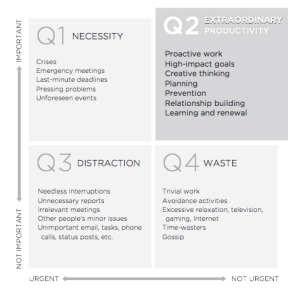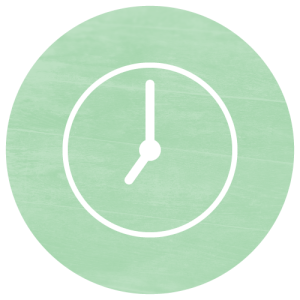Five Productivity Questions I Ask Every Single Day
Is is possible asking key questions at the beginning of each day that will make our day more productive?
What if these key questions removed some stress and at the same time actually gave you more satisfaction at the end of the day because your productivity increased?
Time is one of my most valuable resources. Therefore I must leverage and maximize each precious moment given to me.
I travel a ton for work. I drive a ton every other weekend. It would be easy to use that as an excuse not to be productive.
But the exact opposite is true. I must be that much more vigilant to maximize my time wisely to be productive no matter where I am or what my schedule holds for the day ahead.
There are Five Productivity Questions I Ask Every Single Day:
1. What is the ONE THING that must get done today no matter what today?
Anyone who is productive has that one thing that just must be done today. Whether we put something off or it has a deadline, today is that day for completion.
It’s the one thing that will make or break my day with either its completion or quality of work.
When I ask this question, what is the one thing that must get done today no matter what, it forces me to isolate the absolute most important task that must be done and then I schedule it first at all costs.
But yet so often it’s not only a low priority today, it’s put off to the end of the day and two things happen as a result:
I feel rushed and the quality of the work suffers
I’m unable to give it my best effort because so much of the day has taken my best focus
This is completely avoidable by asking this question to begin your day and scheduling it as the 1st major thing you focus your best attention on this morning.
2. What is something I need to do but don’t want to do today?
There is ALWAYS something in your day you simply don’t want to do. And if you’re lucky, there may be more than one or potentially your entire day!
Know thyself. If you’re anything like me, you don’t like to do what you don’t want to do. Normally, this is not a big deal. But it is with productivity.
Sometimes the very thing you don’t want to do today is the ONE THING that just needs to get done today no matter what (question #1).
For me, my tendency is to put it off so I pay the price of both not wanting to do it AND having to get it done today (of course, at no additional charge, right?)
In a perfect scheduling day, I will do what absolutely needs to be done as my first time block of the day and if possible, knock it out before doing anything else.
Then secondly, move on to something I need to do but don’t want to do today.
If I can make some progress on this dreaded task (not to be dramatic, right?), it takes the mental edge of completing it because it’s already begun and usually not as bad as I made it out to be. And often, it doesn’t take as long especially if I focus on it for a chunk of time.
The key is knocking it out early so you don’t feel pressure on top of disdain for the task.
3. What could I start today that will avoid an emergency tomorrow?
Both of the first two questions can be dramatically influenced and affected to the positive by asking this question.
This is where thinking ahead and planning takes the pressure off of tomorrow. It moves something from Q1 – Urgent and Important to Q2 – Not Urgent and Important.
[tweetthis twitter_handles=”@brybuckley” remove_url=”true”]We have enough urgency and stress in any given day. If I can avoid any of it by thinking ahead, it’s worth my time and effort today.[/tweetthis]If I have a major presentation to create or a large project to complete, if I can begin that process ahead of time to avoid an emergency tomorrow, two things ultimately happen:
I don’t feel the overwhelming stress tomorrow of completing it that day
My quality of work increases because I’m not rushed
I prefer to allow thoughts to develop and unfold rather than appear and go with the first idea.
Asking this question will allow that key development and minimize your stress for tomorrow.
4. Where could I potentially lose a large portion of time today?
According to Kenneth Ziegler’s research, we tend to underestimate, on the average, by 20 percent the time a task will take.
Everyday offers a task, meeting, conference call, interruption etc. that could suck the life or any extra margin completely out of your day,
This question forces me to look at my day objectively and see where I may need to pad some time to make sure I don’t get off schedule or at least too far off schedule so that something major isn’t completed.
For example, if I’m working on a big project or presentation, I have a gift of under-estimating how long it will take for it to not only be completed but edited, get feedback, and finalized.
I also have certain calls, meetings, etc. which no matter how long the scheduled time states, ALWAYS goes longer yet I never schedule this overage.
This is a solvable problem by asking this question, where could I lose a large portion of time today?
It’s taking control of YOUR schedule to maximize YOUR productivity. Go into your day with “Eyes Wide Open” of where may lose valuable time and plan ahead for this predictable loss.
5. When can I batch common activities together today?
There are a few activities that you do every single day: emails, phone calls, filing, etc.
But when these tasks are done in isolation, they seem to take much longer and knock me off focus far more than is necessary and definitely beneficial.
This is where batching activities is absolutely critical. The concept was introduced to me by Kenneth Ziegler in his highly recommended book, Organizing for Success.
Batching common activities is such a simple concept but so few implement the concept. It’s taking similar activities and doing them at the same time.
For example, let’s say you implement Question #1: What is the One Thing That Must Get Done Today?” before checking email. AFTER and ONLY AFTER you complete your one thing, you took 20 minutes and went after your Inbox.
Since I’ve applied this theory, I get SO many more emails completed because I’m in that mindset and that is my task not bouncing from one thing to another.
The same is true batching phone calls, office busy work such as filing, errands, etc.
But this question must be asked at the beginning of the day to maximize your productivity.
In the End…
Learning to ask these or other productivity questions to begin your day will exponentially affect the results of your day.
I challenge you to ask these five questions for the next five work days and measure the results. Just the simple process of thinking through your day will yield positive results.
Motivated, busy professionals think differently to escape their average. They don’t compare themselves to anyone else but know they can always personally improve.
And this is a perfect way to to excel in an area that only you can control: your productivity.
Closing Question…
Which of the five questions should you ask yourself first that will make the greatest impact on your productivity tomorrow?



